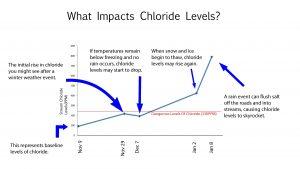Gaithersburg, MD – Across the country, communities are preparing for another long winter of ice, snow – and road salt. Although road salt can help keep drivers safe, excess salt can cause corrosion in drinking water systems and create toxic conditions for fish and wildlife. The Izaak Walton League’s Winter Salt Watch program gives volunteers tools to identify excess road salt problems and share best practices with their communities.
 After a winter storm, the road salt (sodium chloride) put down on to roads and sidewalks can wash into nearby streams, where it can create toxic conditions for fish and wildlife. Many of these same streams feed public water supplies, where excess dissolved salt can corrode pipes in our drinking water systems, causing them to leach dangerous metals such as lead or copper. Water treatment plants are not equipped to filter out excessive amounts of salt, so it can end up in our tap water – a problem for people with high blood pressure and other health conditions that require a low-sodium diet.
After a winter storm, the road salt (sodium chloride) put down on to roads and sidewalks can wash into nearby streams, where it can create toxic conditions for fish and wildlife. Many of these same streams feed public water supplies, where excess dissolved salt can corrode pipes in our drinking water systems, causing them to leach dangerous metals such as lead or copper. Water treatment plants are not equipped to filter out excessive amounts of salt, so it can end up in our tap water – a problem for people with high blood pressure and other health conditions that require a low-sodium diet.
Last winter, the Izaak Walton League launched Winter Salt Watch after staff saw first-hand the impact of excess road salt (sodium chloride) on the creek near the League headquarters in Maryland. The League distributed more than 275 chloride test kits to volunteers across the country, and these citizen scientists posted more than 75 results to our national map on Water Reporter. Gearing up for this winter, the League has already sent free chloride test kits to more than 100 new stream monitoring volunteers.
“It’s important to test chlorid e levels before the road salt starts to pile up,” says Danielle Donkersloot, the League’s Clean Water Program Director. “We call that getting a ‘baseline’ reading. It gives volunteers a number against which to compare chloride readings throughout the year. Without a baseline, communities can’t effectively track changes in chloride levels – or figure out what’s causing those changes, such as road salt application.”
e levels before the road salt starts to pile up,” says Danielle Donkersloot, the League’s Clean Water Program Director. “We call that getting a ‘baseline’ reading. It gives volunteers a number against which to compare chloride readings throughout the year. Without a baseline, communities can’t effectively track changes in chloride levels – or figure out what’s causing those changes, such as road salt application.”
Interested volunteers can order a free chloride test kit at iwla.org/saltwatch. The Winter Salt Watch web page also provides tools to help volunteers advocate for best practices in their communities.
Every American has the right to clean water. Monitoring local streams is critical to finding – and fixing – water quality problems. To learn more, visit iwla.org/saltwatch.
###
Founded in 1922, the Izaak Walton League of America (www.iwla.org) protects America’s outdoors through education, community-based conservation, and promoting outdoor recreation.

